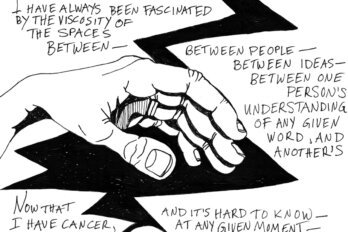Catherine O’Hara is whispering to Eugene Levy. We’re in a church, and all is quiet—not in observance of the Lord, but in thrall to a far less holy deity: television. Episode nine of the CBC’s new comedy series, Schitt’s Creek, takes place at a funeral, and St. Simon-the-Apostle Anglican Church in downtown Toronto is abuzz with crew. Some people are outside in the spring sunshine, others are inside the nave watching a row of monitors, and still others—myself included—are sitting on wooden pews. Cords run underfoot, snaking around the edges of the aisle. On a monitor near me, the lens focus shifts in and out before settling on the doorway of a small chapel, where the scene is taking place.
I cannot yet see O’Hara, but I can hear her persistent whisper in my headphones. It’s unmistakable, evoking a bevy of classic SCTV and Christopher Guest characters. “I just don’t care for it,” O’Hara says; what she doesn’t care for is unclear, but her voice is nasal, disdainful. In the series, it’s the voice of Moira Rose, wife of disgraced video kingpin Johnny Rose (played by Levy). “Mmph,” comes Levy’s grunted response, his voice as distinctive as his co-star’s.
“Action!” calls the director. On the monitor, Johnny and Moira stride through the door arm in arm, he in a well-cut suit and she in a high-art ensemble worthy of Delia Deetz, the character O’Hara played in Beetlejuice. The scene begins. Gradually, I understand that what I just heard in my headphones was unscripted. As the shoot continues, O’Hara offers something different each time, in this moment when no one is listening except Levy (and us). It’s intimate and intentional, befitting this pair of frequent collaborators.
In Schitt’s Creek, a filthy-rich family has lost everything except for the tiny titular town, which the patriarch once bought as a joke; the Roses move there in an effort to survive and rebuild. With two high-profile stars in the lead roles, Schitt’s Creek is the Mother Corp’s latest attempt to drive its offerings into the new TV landscape. It’s a crowded field, one dominated by streaming services such as Netflix and cable networks such as HBO—companies that are beholden less to advertisers and more to discerning subscribers, and that emphasize originality and artistry in their programming.
That shift appeals to Dan Levy, the series’ co-creator, writer, showrunner, and co-star—and Eugene’s son. To his peers, Dan is familiar as an MTV Canada personality and an eyewear designer. A brand unto himself, he looks like his father (eyebrows especially) filtered through Toronto chic, a poster child for new Canadian media.
After his time at MTV ended, Dan felt he was ready to create something of his own. Still, he held off on approaching his dad. “I had never gone to him for anything,” Dan says between takes, sitting on a bench behind the church. “I felt the need to prove myself.” He had an idea for a show about a wealthy family that falls on hard times. Then he stumbled across the story of Braselton, Georgia, a town that the actor Kim Basinger effectively bought for $20 million in 1990; she sold it several years later, after she declared bankruptcy.
The Levys formed a company—Not a Real Company Productions—and put together a fourteen-minute pilot. The CBC jumped at it immediately. “It’s a simple but brilliant premise—the idea that the insiders are now the outsiders,” says Sally Catto, general manager of programming. “Inherent in that premise is a dysfunctional family learning to be a real family. Not in a saccharine way, but in a genuine way.” The name, Dan explains, comes from an exchange between his father and a family friend, actor Martin Mull. During a rowdy evening at a restaurant, they spent several hours laughing over the possibilities of a town called Schitt’s Creek.
Don’t let the merdique moniker fool you, though: the show has more grounded aims. “We intended for it to be a cable show,” Dan says, citing HBO’s political comedy, Veep, as an inspiration. “It’s a little darker, a little edgier, a little more real.” Schitt’s Creek sets the Rose family adrift and stands back to watch them try to cope. Less Veep, it’s more akin to It’s Always Sunny in Philadelphia, another comedy that glares lovingly at a gaggle of unlikeable characters. Schitt’s Creek succeeds in striking this delicate balance, though it is sometimes a little kinder to its characters than it needs to be; that gentle touch still feels more CBC than AMC. But the writing is good—and, yes, it’s funny. Very funny.
As morning tilts into early afternoon, Dan is called back to set, to step into the role of spoiled child David Rose. At first, the elder Levy was concerned about his son’s turn in front of the camera. “He felt protective of me,” says Dan, “as any parent would.” But when production began, they fell into a comfortable groove. When the show breaks for lunch, I walk back toward the church. Dan stands on the steps, speaking to a crewmember. He raises those Levy eyebrows, claps the man on the back, and then bounds inside to eat with his father.
This appeared in the March 2015 issue.






